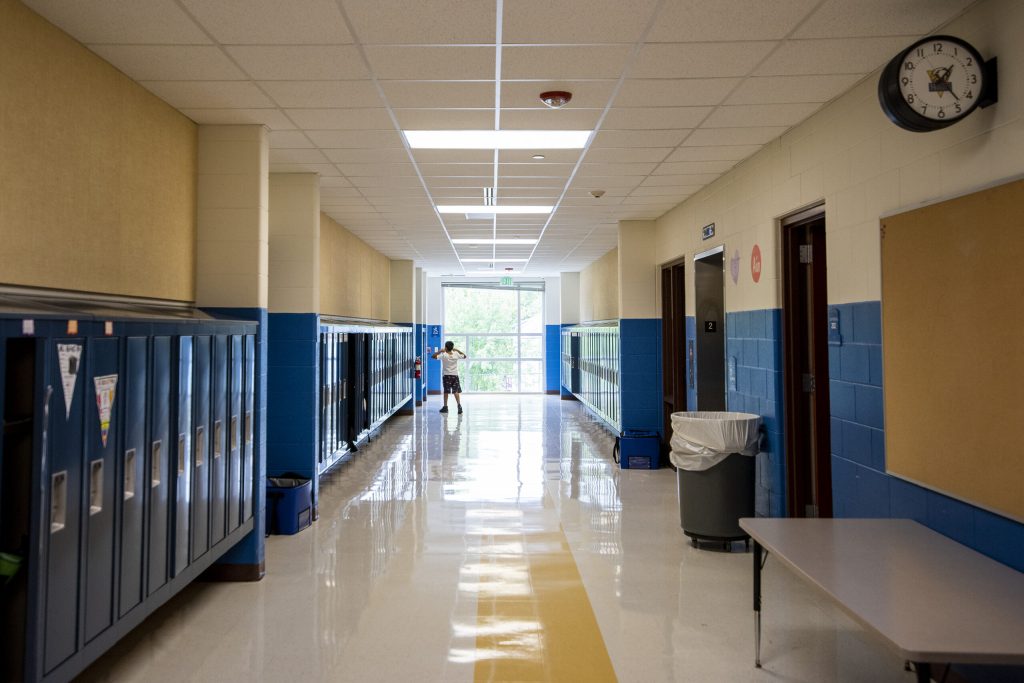Bill That Would Hold Students Back For Truancy Passes First Major Hurdle
Assembly passes bill that would make frequently absent students repeat their current grade, sends it to Senate.

A student walks down a hallway with lockers Friday, Sept. 17, 2021, at Hackett Elementary School in Beloit, Wis. Angela Major/WPR
Wisconsin’s Republican-controlled Assembly approved a bill Wednesday that would hold students back a grade for truancy.
The legislation, which now heads to the state Senate, would bar students from advancing to the next grade if they have more than 30 full days of unexcused absences.
It would apply to public schools, as well as to private schools that get state funding, starting in the 2025-26 school year.
Proponents argued that the legislation would increase accountability on parents who don’t sufficiently ensure their kids’ school attendance.
“By never having any type of repercussions for our actions, where would we be?” said Rep. Amy Binsfeld, R-Sheboygan, who chaired the Assembly Task Force on Truancy. “We have to get back to our schools being responsible for teaching our students and knowing the rights and responsibility of our parents, students, teachers.”
The state’s attendance rate has been dropping since the COVID-19 pandemic, reaching a low of 91 percent in the 2021-22 school year, the last available year of state data.
More than a fifth of Wisconsin students missed at least a month of school, and truancy rates were higher among high schoolers and in districts with higher percentages of minority students and students living in poverty, according to the data from Wisconsin’s Department of Public Instruction, or DPI.
The DPI opposes the bill.
“Wisconsin, like many other states, faces a school attendance challenge. But it’s one that must be carefully addressed with evidence-based solutions and not with bills that would further harm our kids,” State Superintendent Jill Underly said in a statement earlier this month. “Legislation being discussed today in the Capitol appears to be intent on punitive measures that would discourage kids, create challenges for families, and are likely to actually increase absences and the likelihood of student dropouts. Mandatory grade retention is not a realistic solution and does nothing to improve student outcomes.”
Should the bill pass the Senate before it adjourns for the year, Democratic Gov. Tony Evers could end up vetoing the bill, which passed the Assembly on a voice vote.
The state Assembly also passed related bills Wednesday, which include setting definitions of truancy in state law and providing school districts with $2 million in grants in the 2024-25 school year to reduce truancy.
A third bill approved Wednesday would require that parents be informed of their right to request a disability evaluation as part of the notice parents receive once a child misses five or more days of school in a semester.
Democrats argued that the bills do not address underlying causes of chronic absenteeism, such as housing instability, hunger, transportation access and mental health support.
“There is absolutely no evidence at all or research to support that holding kids back will somehow incentivize them and help their family overcome barriers to getting them to school,” said Rep. Kristina Shelton, D-Green Bay, who also sat on the truancy taskforce.
Other education bills clear Assembly
The Assembly also passed multiple curriculum-related bills this week, which now head to the state Senate.
One would mandate that cursive be taught at elementary schools that receive state funding, with the goal of ensuring that students can write legibly in cursive before fifth grade. Another would require K-8 students to get at least three hours of physical activity each week.
Republicans also passed legislation that would require public schools to make textbooks, curricula and other educational materials available for district residents to inspect upon request within 14 days.
Additionally, a bipartisan proposal that cleared the Assembly Tuesday would require districts to teach about the history and contributions of Hmong and Asian Americans. Current Wisconsin law requires districts to develop curricula that give students an “understanding of human relations, particularly with regard to American Indians, Black Americans, and Hispanics,” but it makes no reference to Asian Americans.
Lawmakers also approved a bill to put $100,000 per year towards Holocaust education efforts through 2025. Rep. Lisa Subeck, D-Madison, became emotional on the floor as she spoke in support of the legislation, which passed unanimously less than four months after a neo-Nazi group marched through downtown Madison.
“This is one small step and an opportunity for all of us to say we value diversity, but more than that, we recognize the horrors of history and will not let it repeat itself,” she said.
The state Assembly is scheduled to hold what could be its final session day of the year Thursday.
Assembly passes bill to hold Wisconsin students back for truancy was originally published by Wisconsin Public Radio.
If you think stories like this are important, become a member of Urban Milwaukee and help support real, independent journalism. Plus you get some cool added benefits.






















AHHHHHHHH Let’s start with WHY do kids skip school??? Many skip school because they have been traumatized and their brains have been injured by the trauma!!
Bruce again lets begin a conversation This is not a political issues
Call me 414 403 1341
Thomas Spellman
This group of bills are probably the most ignorant educational policy to come out of the Republican caucus in decades. Why should anyone assume that a parent who chooses not to send their child to school or a high school student choosing to hand with friends outside of school somehow demands a special education evaluation? Retention of truant students because of their parent’s malfeasance would easily end up with retained students becoming behavior problems having to be a grade that they were in before. Milwaukee County District Attorney’s Office going back to E. Michael McCann has never made enforcing the State’s mandatory attendance law by charging parents a priority. Charging parents of students in elementary schools who do not send their children to school would have an impact on truancy.